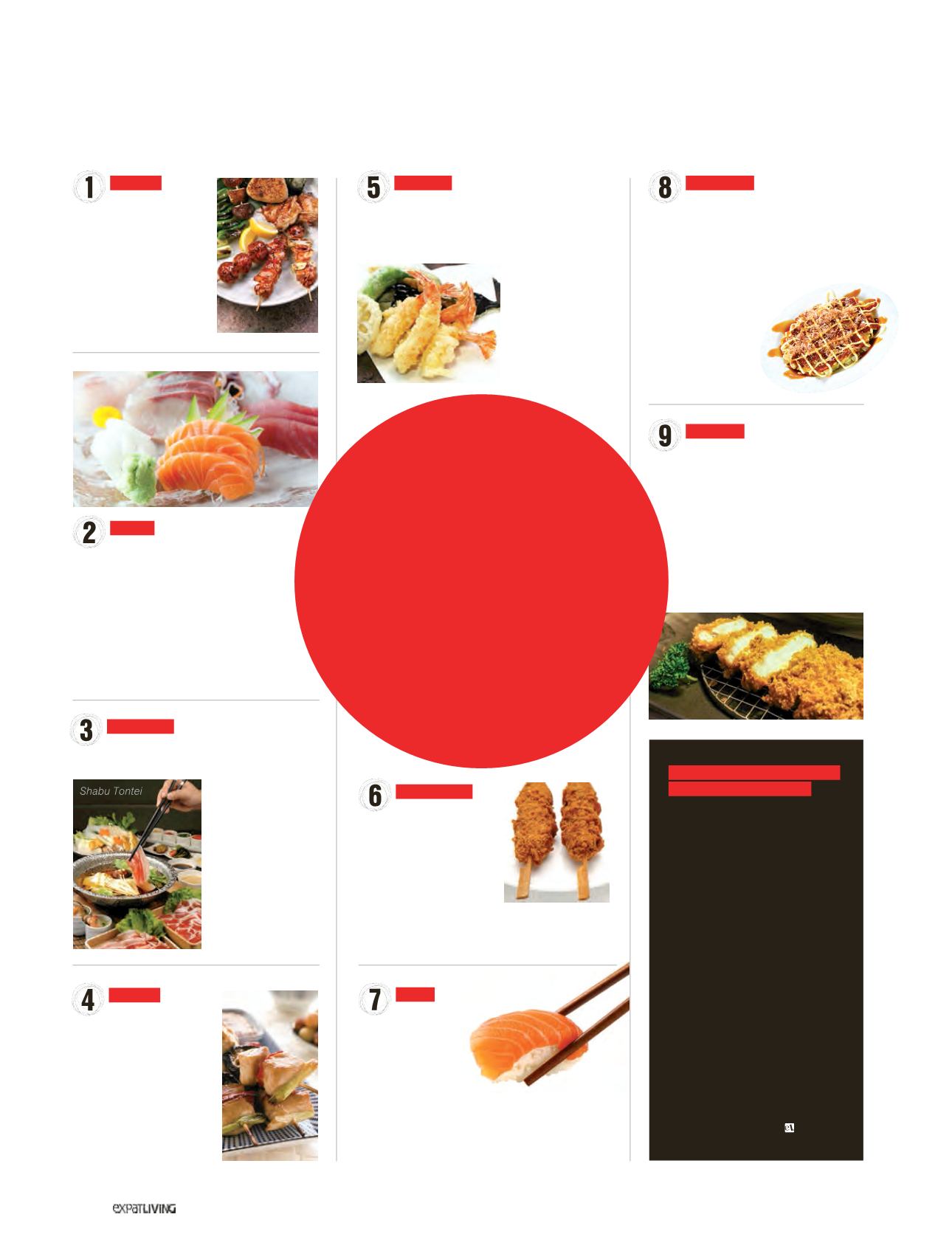

WINE&DINE
198
January15
TEPPANYAKI AND ROBATAYAKI:
WHAT’S THE DIFFERENCE?
Often shortened to just “
robata
”,
robatayaki
literally means “fireside
cooking”; it’s a method of cooking,
similar to barbecuing, in which
skewered meat, seafood and
vegetables are slow-grilled over hot
charcoal.
Teppanyaki
, on the other
hand, is a style of Japanese cooking
that uses a flat iron griddle to cook
foods like steak and
okonomiyaki
.
The word is derived from
teppan
,
meaning “iron plate”, and
yaki
,
which means “grilled”, “broiled”
or “pan-fried”. Modern
teppanyaki
grills are mostly propane-heated
and often used to cook food in front
of guests at restaurants.
Teppanyaki
grills are often confused with
hibachi
barbecue grills, which
have charcoal or gas flames with
an open-grate design.
There’s much more to Japanese
cuisine than the ever-popular
California roll and spicy tuna sushi.
Here are nine top dishes to try now.
9
JAPANESE
DISHES
TO KNOW
IZAKAYA
Izakaya
is akin to tapas:
casual food eaten with
an alcoholic beverage
or three. This similarity
to tapas doesn’t extend
any further, though; the
Japanese version includes
raw fish to go with your
beer or sake.
SASHIMI
Sashimi is thinly sliced raw
seafood – including anything from
salmon (
sake
), tuna (
maguro
), yellowtail
(
hamachi
) andmackerel (
saba
) to octopus
(
tako
), scallop (
hotate-gai
) and sea urchin
(
uni
) – and is normally served with a
dipping sauce (soy sauce with wasabi, or
ponzu) and grated fresh ginger, and often
garnished with shredded daikon radish.
Many places pre-freeze sashimi for food safety.
SHABUSHABU
Alsoreferredtoassteamboat
in Southeast Asia,
shabu shabu
is a dish
of thinly sliced meat boiled in water. Beef
is traditional, but
many restaurants
now also offer a
selection of pork
and chicken slices.
Interestingly, the
name is derived
from the sound
the meat makes
when stirred in the
cooking pot.
YAKITORI
Although
originally used
to describe Japanese
skewered chicken, the word
yakitori
can also refer to
skewered food in general.
Kushiyaki
means the
same thing, and the terms
are interchangeable, so
whichever is used, skewers
will be on the menu.
TEMPURA
Lightly battered and deep-
fried strips of vegetables and seafood,
usually dipped in a light soy sauce. The batter
is kept cold prior to frying and does not include
breadcrumbs. Tempura can be eaten alone
or served over
noodles or rice.
It’s thought that
Portugese Jesuit
m i s s i o n a r i e s
i n t r o d u c e d
tempura to Japan
in the late 1500s.
KUSHIKATSU
(or
kushiage)
Skewered
s e a f o o d , s e a s o n a l
vegetables and meat:
lightly breaded, deep-
fried and served piping
hot. In Japanese,
kushi
refers to the skewers and
katsu
to the pieces of meat. First served, they
say, in the city of Osaka.
SUSHI
Fish on
rice, right?
Kind of. Although
fish is the star of the
show, the term sushi
actually refers to the
vinegar rice. With so
much importance placed on the grain (a sushi
chef spends at least two years learning how to
prepare and season rice), a sushi restaurant can
rise or fall on its rice alone.
OKONOMIYAKI
Although often called
“Japanese pizza”,
okonomiyaki
involves neither bread nor tomato sauce
(and rarely cheese), nor is it baked in an
oven. This pancake-omelette contains a
mix of seafood, meat or vegetables held
together by a cabbage and
green onion batter and
topped with special
o t a f u k u
s a u c e ,
Japanese mayo,
and seaweed and
bonito
flakes.
TONKATSU
Thought to date back
to 19th-century Japan,
tonkatsu
is
a crumbed, deep-fried pork fillet or loin, but
the pork can be substituted with prawn or
fish. Normally ordered as a single dish,
it can also be eaten in a sandwich or
with curry sauce. It always comes with
shredded cabbage, and is typically
dipped in a thickWorcestershire-style
sauce called
tonkatsu
sauce, served
with rice and eaten with chopsticks.
Ishinomaki Grill
and Sake



















